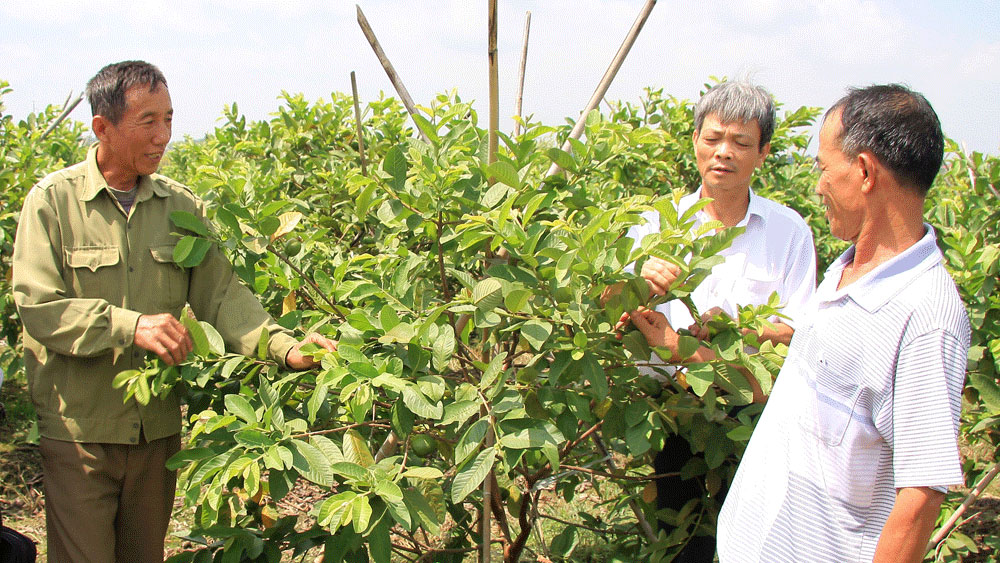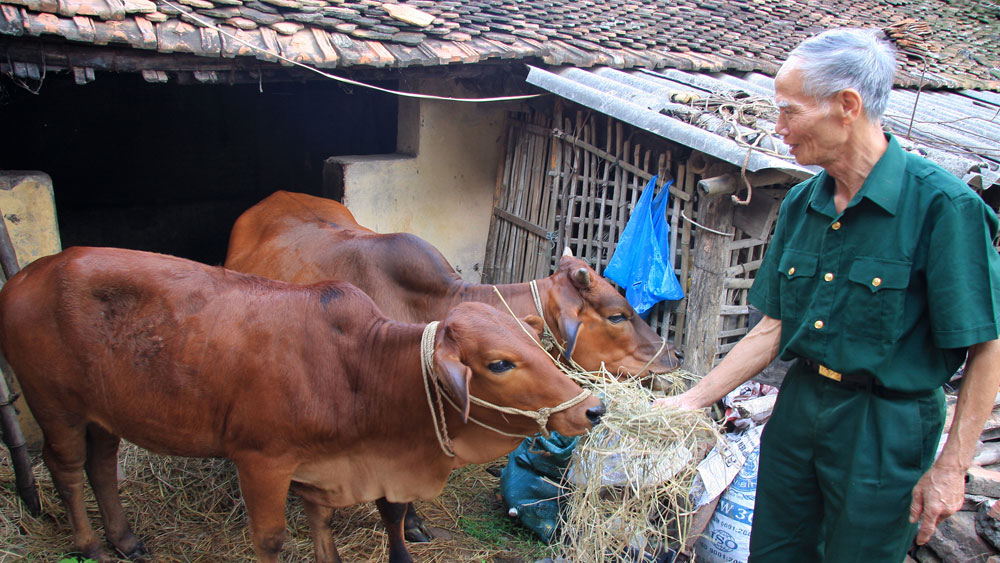Helping national contributors not to become poor again
Choosing appropriate forms of support
In the plan of implementing the poverty reduction targets in 2019, the provincial Department of Labour, Invalids and Social Affairs (DOLISA) suggested the provincial People's Committee implement solutions to reduce all poor households under the preferential policy for national contributors.
 |
|
War invalid Nguyen Khac Dam (born in 1956, left) in Hue Van 1 village, Bao Son commune (Luc Nam district) escapes poverty from the guava-growing model. |
According to Nguyen Van Ngoc, head of the DOLISA’s social protection division, from this policy, localities have focused on reviewing and firmly grasping the situation of national contributors from poor households in the whole province. After that, they proposed suitable forms of support to help the households to rise out of poverty and gradually stabilize their lives.
Through the review, there are still 125 households with members who are enjoying the preferential policy for national contributors in 7 districts including Luc Ngan, Son Dong, Yen The, Luc Nam, Tan Yen, Yen Dung and Hiep Hoa.
Luc Nam district has 39 poor households whose members are national contributors. Vu Tri Bao, head of the district’s labour, invalids and social affairs division, said in 2019, with the attention and assistance of agencies and localities, 22 households voluntarily registered to escape poverty. Seven others also removed from the list because their members who were national contributors died or moved to live with relatives with better living conditions.
The remaining 10 households who really faced difficulties in housing and living conditions received nearly 120 million VND (5,170 USD) from the "Den on dap nghia" (Gratitude) Fund. As a result, at the end of 2019, the district had no poor national contributor households.
Not only providing funds for house repairs, localities have also supported capital and seedlings to help poor households with members who are national contributors escape poverty. For example, Nguy Phan Binh (born in 1956), a war invalid and Agent Orange victim in Tan Ninh village, Tu Thuong commune (Yen Dung district) tried to improve his living conditions thanks to livelihood support.
In 2016, through the provincial Red Cross Society, his family was presented a reproductive cow worth 15 million VND (nearly 650 USD). After a period of time caring the cow and saving money from selling calves to invest, now his family raises about 20 cows, becoming an example of wounded soldiers trying to escape poverty in the locality.
Continuing to review and maintain results sustainably
Currently, the province is managing about 160,000 national contributors’ records, including 21,000 martyrs; 22,000 wounded and sick soldiers; and more than 1,300 Heroic Vietnamese Mothers. The remaining are people who joined resistance wars and AO victims. Over 28,000 national contributors and their relatives receive monthly allowances.
 |
|
Thanks to livelihood support, Nguy Phan Binh in Tan Ninh village, Tu Mai commune (Yen Dung district), moves out of poverty. |
Thanks to social sources, the "Den on dap nghia" (Gratitude) movement in the province has gained many outstanding results, significantly improving the lives of war invalids, sick soldiers and policy beneficiary families.
As the locality with the largest number of poor households whose members are national contributors in the province (58 households), with conditions more difficult than those in the lowland districts, Son Dong has still fulfilled the set target. According to Giap Van Tam, Vice Chairman of the district People's Committee, with the determination in 2019, all national contributor households got out of poverty. The district People's Committee devised plans and assigned specific tasks to each specialized unit, while closely coordinating with the Fatherland Front Committee and its member organizations to directly come to find out the causes and capture the needs of each household to have appropriate poverty reduction solutions.
After providing assistance for households to escape poverty, representatives of the mass organizations still regularly visit to grasp the situation of each household for timely support, preventing them from falling back into poverty.
Regarding long-term solutions, for households whose members are unable to work, agencies at all levels, sectors and localities will continue to provide them with regular and long-term support from social sources.
For poor national contributor households who still have production opportunities, priority is given to integrating poverty reduction programmes and projects to support them with loans, seedlings, breeding animals and techniques, helping those who rendered service to the nation build a suitable economic model to increase income. Besides, it is necessary to persuade the households to eliminate the idea of depending on others and rise up in life by themselves.
Tuong Vi
 Bắc Ninh
Bắc Ninh















Reader's comments (0)